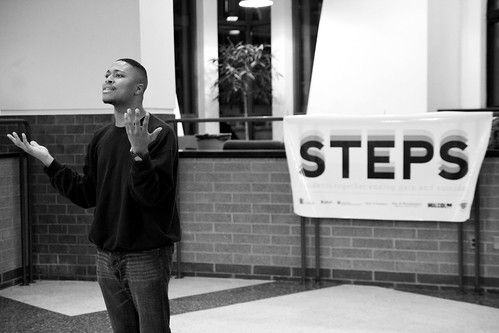
On Feb. 16, students, faculty and administrators gathered to raise awareness in light of the suicide on Main Campus earlier this month.
Students pass hundreds to thousands of unknown faces each day on Main Campus, whether it’s walking to and from class, grabbing a bite to eat or attending social events. The oddity in it all is not knowing what each person’s life story may entail.
Depression on college campuses is high, and with the recent suicide of Tobi Lim Sonstroem on Liacouras Walk, the prevalence of suicide became apparent for many.
Malcolm Kenyatta, a senior strategic communications major created the program Students Together Ending Pain and Suicide as an open forum for those who have been directly or indirectly affected by suicide to speak up and get help.
“It gives those a chance to use their voice and be surrounded by others who may feel the same way as you,” Kenyatta said.
Kenyatta added that in certain communities, particularly the African-American one, “it is extremely difficult to talk about anything that makes one vulnerable.”
The idea for STEPS first originated in 2011 after Roswell Friend, a graduate and friend of Kenyatta’s, committed suicide. Kenyatta attributed Dr. Stephanie Ives, the dean of students, and Captain Eileen Bradley who works for Temple Police for both implanting the initial idea for the program into his head.
When someone from one’s college community commits suicide, it takes a toll on the student body. Kenyatta said he had been planning to create a group specifically as a result of the death of Friend, but as time went along there still was no structured organization, group or program.
After the suicide of Sonstroem, the drive to formulate some outlet came back to him and he said he realized that “something has to be done now.”
“For someone to shoot themselves on a major campus is something that could be a catalyst that draws attention to issues like these that happen not just on campuses but also in our age group,” Kenyatta said.
Kenyatta invited organizations on campus including BABEL, OwlCapella and Temple Gospel Ministries to perform at the STEPS event, which took place in the Atrium of the Student Center on Thursday, Feb. 16. Staff members from HEART and Tuttleman Counseling Services also were instrumental in contributing their support for the program.
Instead of STEPS becoming an actual organization on Main Campus, Kenyatta said he decided to make it a program.
“It is a one time thing,” Kenyatta said. “I am providing an avenue of support for people who need support and who want to share their stories or get anything off of their chest. All I can do is provide people with support and information, and once it’s out there, it is to their advantage to use it.”
Although we don’t live in a society in which we will ever be able to prevent all suicides, there are steps that can be taken to diminish those attempts or thoughts.
“If the program can prevent one person to reconsider committing suicide or even encourage someone to use the services on campus and get help, my efforts to create STEPS were successful,” Kenyatta said.
“There aren’t many groups on campus that speak about those issues and STEPS was really created to provide that outlet to express bottled in emotions,” Kenyatta said.
Kenyatta said he believes that it is necessary for people to share their stories because for those who have known of people to commit suicide, it is important to express how much of an effect it had on them so that those who are considering it can begin to understand how important their lives truly are to their peers.
“The creation of this program made a powerful statement, not only to those who were aware, but to those who may have been unaware and never thought about how serious suicide actually is,” urban education graduate student Akeem Lloyd said.
“It brought back the theme that you really don’t know what’s going on in a person’s life. I hope this initiative grows and doesn’t stop here,” senior social work major Nailah Ikenna said.
It is imperative to take an active role in the lives of one another because “we as citizens have a responsibility to do what we feel is right,” Kenyatta said.
“There is nothing too big or too small when it comes to helping somebody out,” he added. “We have a moral responsibility to better the world in whatever way we can.”
Shanell Simmons can be reached at shanell.simmons@temple.edu.



Be the first to comment